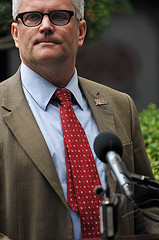“… if the community doesn’t have the power to choose a solution, it doesn’t matter how good the solution is… To empower the community and find a way forward, I pledge that my staff and the Portland Bureau of Transportation staff will support you and work with all stakeholders to make progress.”
— Mayor Sam Adams
As PBOT’s North Williams Traffic Safety Operations Project has evolved from just a small transportation project into a full-blown, community-wide discussion about gentrification and community power (or lack of it) in the decision-making process, Portland Mayor Sam Adams decided it was time to weigh in.
In a letter sent out yesterday to the project’s 18-member Stakeholder Advisory Committee, Adams addressed the many sensitive topics that this process has brought to the fore. I am working on a recap of an important meeting that took place last night. In the meantime, I’ve posted Adams’ letter below:
Thank you for working to make North Williams Avenue a safer, more efficient transportation corridor. Your commitment to extend your service and expand your committee to achieve the first objective of the North Williams Traffic Operations Safety Project – to conduct an open planning process through which all voices can be heard – is appreciated and commendable.
As with many of the city’s major projects, this one began as the reconsideration of a public space and quickly evolved into a community-wide discussion about the history of a neighborhood and its historical treatment by government, changing demographics and the nature of decision-making. Although these issues may not sound like the transportation problems you signed up to solve, they are important to me, as well as all Portlanders.
In addition to welcoming the new members on the stakeholder advisory committee I’m very pleased that Debora Leopold Hutchins has accepted the responsibility of acting as chair. I know that Debora brings to this task an understanding that bridges many perspectives, and, as a committee member, she has demonstrated significant leadership in helping the project staff navigate community concerns. I ask that you support her.
As a committee, you have the chance to model the kind of respectful listening and thoughtful deliberation that we need for all our public processes. I encourage and applaud you opening yourselves to this honest conversation to explore intersections of this project with gentrification, privilege, community power and historic disenfranchisement. I want to acknowledge that this is hard work, and express how grateful I am that you are willing to undertake it. I ask you to bring your whole passion and creativity to this open, engaged process.
Portland has a long tradition of community involvement in public decision-making. It’s by no means perfect, but I ask you to draw on and improve that tradition in this process. As one participant has said, if the community doesn’t have the power to choose a solution, it doesn’t matter how good the solution is. I couldn’t agree more. To empower the community and find a way forward, I pledge that my staff and the Portland Bureau of Transportation staff will support you and work with all stakeholders to make progress.
Thank you for choosing to spend your time and energy to serve all Portlanders, and for your commitment to inclusive, respectful public involvement.
The meeting last night was a positive step forward. Stay tuned for a full recap (and The Oregonian had a videographer, photographer, and reporter their too, so expect to see some coverage from them as well).


